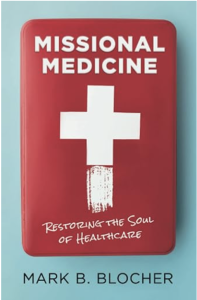Review of Missional Medicine—Restoring the Soul of Medicine, Mark B. Blocher, M.D., 2022, 175 pages, ISBN 9781792383069, $20, amazon.com (Paperback)
Imagine if you were about to undergo a major surgical procedure, and your surgeon came in and asked if you wanted to pray first, or have a serious conversation about the state of your soul?
Today’s patient would probably bolt. We expect physicians to perform miracles but forget doctors are not the final arbiters of life and death. Having that discussion would not be out of line but it rarely if ever happens in today’s hospitals and exam rooms. The most patients might get is “Are your affairs in order?”
Such is the premise of Missional Medicine—Restoring the Soul of Medicine, Mark B. Blocher’s insightful, common-sense, engaging, and must-read treatise on the state of modern medicine, and how abstracted it has become from the genesis of health care. The secularization of health care can be blamed for all that is dysfunctional in health care—the insurance-payer morass, volumes of government regulation, physician, and health care professional burnout, and the always escalating costs and wait times for care.

Missional Medicine in Practice
Assembly-line medicine has no room for compassion, let alone prayer. When you ask health care professionals why they chose medicine as a career, or patients what they are really seeking from the health care system, it is more than a means to make money or relief from a physical ailment. Medical science forces everyone to think about the existential questions, Why am I here? What is my purpose? Why do I suffer? So, why is any discussion about God in the exam room off-limits?
Blocher is a medical ethicist and co-founder of Christian Healthcare Centers (CHC), an amazing non-profit direct primary practice (DPC) that has revolutionized health care in Michigan. I can testify to this as a member of CHC when it first opened its doors in 2017. I have never seen my physician for less than 30 minutes. I can get medical attention within 24 hours and my physician knows most things about my life because he has time to talk to me.
DPC works outside the third-party insurance system and because of that can save time and bundles of money not dealing with insurance pre-authorizations and claims. CHC charges less than $90 a month and offers discounted imaging, labs, and drugs. I can give countless examples of how CHC has made me a better medical consumer. For example, my doctor had given me $20 cortisone injections when most specialists wanted to march me straight to the surgical suite, uncertain my condition was chronic.
Health Insurance Addiction
Health care has lost its soul and Blocher places much blame on the public’s addiction to health insurance. Blocher devotes an entire chapter to the harms of having “others” pay health care bills. One effect is the behind-closed-door deals insurers make with providers, which have more to do with driving up profits than taking care of people.
“Since Obamacare went into effect, many large hospital systems and insurance companies have seen their profits rise substantially, leaving little incentive to reform how we pay for healthcare,” writes Blocher.
Even employer insurance is not beyond reproach, since employees have little say in what their health plan covers. Asks Blocher, “Since employees bear an increasing amount of the health plan cost, why should anyone other than the employee decide what their health plan will be? What other major purchase does the employer make on behalf of the employees? Does an employer decide what house an employee should buy, what car to purchase, or which college her children should attend?”
Blocher gives cost examples of how employers or individuals can save money and get better care with insurance alternatives such as DPC, coupled with a health share ministry, which is not insurance but one example of an affordable option to individuals and families other than “the health plan.”
Shocking Ethics
A meaningful discussion on health care, however, must go beyond economics and examine the shocking ethical lapses taking place in our hospitals, which are under pressure to ration health care. And, increasingly, they ration by death. As difficult as it is to believe, “death panels” exist, readers will appreciate Blocher’s learned perspective as a medical ethicist.
“We have witnessed the application of mostly secular ethics in healthcare long enough to see the inevitable clash of worldviews, especially conflicts between Christianity and secularism,” writes Blocher. “In our mostly secular society, ethical relativism reigns.” This would give a chill to any patient, religious or not, as to why understanding a provider’s worldview might mean the difference between life and death.
Western medicine has always been grounded in Judeo-Christian “moral precepts,” writes Blocher. “These are the moral pillars from which the ‘do no harm” medical ethic flows, and it is this Judeo-Christian ethical formula that has contributed substantially to the development of the premiere healthcare system in the world.”
The Role of Churches
Lastly, Blocher makes a case as to why churches must participate in health care, to “bear one another’s burdens.” If churches viewed health care as part of their mission, their members might be less inclined to depend on the government and health plans to pay the bills.
Blocher’s book was published two years ago but it is prescient if not more today, meaning Missional Medicine is on to something.
AnneMarie Schieber (amschieber@heartland.org) is the managing editor of Health Care News.





















